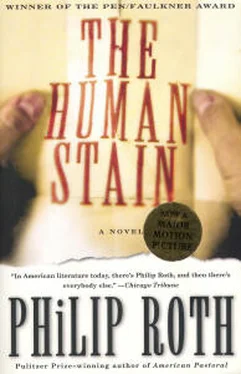Nothing lasts, and yet nothing passes, either. And nothing passes just because nothing lasts.
The trouble with Les Farley began later that night, when Coleman heard something stirring in the bushes outside his house, decided it wasn't a deer or a raccoon, got up from the kitchen table where he and Faunia had just finished their spaghetti dinner, and, from the kitchen door, in the summer evening half-light, caught sight of a man running across the field back of the house and toward the woods. “Hey! You! Stop!” Coleman shouted, but the man neither stopped nor looked back and disappeared quickly into the trees. This wasn't the first time in recent months that Coleman believed he was being watched by someone hiding within inches of the house, but previously it had been later in the evening and too dark for him to know for sure whether he had been alerted by the movements of a peeping Tom or of an animal. And previously he had always been alone. This was the first time Faunia was there, and it was she who, without having to see the man's silhouette cutting across the field, identified the trespasser as her ex-husband.
After the divorce, she told Coleman, Farley had spied on her all the time, but in the months following the death of the two children, when he was accusing her of having killed them by her negligence, he was frighteningly unrelenting. Twice he popped up out of nowhere — once in the parking lot of a supermarket, once when she was at a gas station — and screamed out of the pickup window, “Murdering whore! Murdering bitch! You murdered my kids, you murdering bitch!” There were many mornings when, on her way to the college, she'd look in the rearview mirror and there would be his pickup truck and, back of the windshield, his face with the lips mouthing, “You murdered my kids.” Sometimes he'd be on the road behind her when she was driving home from the college. She was then still living in the unburned half of the bungalow-garage where the children had been asphyxiated in the heater fire, and it was out of fear of him that she'd moved from there to a room in Seeley Falls and then, after a foiled suicide attempt, into the room at the dairy farm, where the two owners and their small children were almost always around and the danger was not so great of her being accosted by him. Farley's pickup appeared in her rearview mirror less frequently after the second move, and then, when there was no sign of him for months, she hoped he might be gone for good. But now, Faunia was sure of it, he'd somehow found out about Coleman and, enraged again with everything that had always enraged him about her, he was back at his crazy spying, hiding outside Coleman's house to see what she was doing there. What they were doing there.
That night, when Faunia got into her car — the old Chevy that Coleman preferred her to park, out of sight, inside his barn — Coleman decided to follow close behind her in his own car for the six miles until she was safely onto the dirt driveway that led past the cow barn to the farmhouse. And then all the way back to his own house he looked to see if anyone was behind him. At home, he walked from the car shed to the house swinging a tire iron in one hand, swinging it in all directions, hoping in that way to keep at bay anyone lurking in the dark.
By the next morning, after eight hours on his bed contending with his worries, Coleman had decided against lodging a complaint with the state police. Because Farley's identity couldn't be positively established, the police would be unable to do anything about him anyway, and should it leak out that Coleman had contacted them, his call would have served only to corroborate the gossip already circulating about the former dean and the Athena janitor. Not that, after his sleepless night, Coleman could resign himself to doing nothing about everything: following breakfast, he phoned his lawyer, Nelson Primus, and that afternoon went down to Athena to consult with him about the anonymous letter and there, overriding Primus's suggestion that he forget about it, prevailed on him to write, as follows, to Delphine Roux at the college: “Dear Ms. Roux: I represent Coleman Silk. Several days ago, you sent an anonymous letter to Mr. Silk that is offensive, harassing, and denigrating to Mr. Silk. The content of your letter reads: 'Everyone knows you're sexually exploiting an abused, illiterate woman half your age.' You have, unfortunately, interjected yourself and become a participant in something that is not your business. In doing that, you have violated Mr. Silk's legal rights and are subject to suit.”
A few days later Primus received three curt sentences back from Delphine Roux's lawyer. The middle sentence, flatly denying the charge that Delphine Roux was the author of the anonymous letter, Coleman underlined in red. “None of the assertions in your letter are correct,” her lawyer had written to Primus, “and, indeed, they are defamatory.”
Immediately Coleman got from Primus the name of a certified documents examiner in Boston, a handwriting analyst who did forensic work for private corporations, U.S. government agencies, and the state, and the next day, he himself drove the three hours to Boston to deliver into the hands of the documents examiner his samples of Delphine Roux's handwriting along with the anonymous letter and its envelope. He received the findings in the mail the next week. “At your request,” read the report, “I examined and compared copies of known handwriting of Delphine Roux with a questioned anonymous note and an envelope addressed to Coleman Silk. You asked for a determination of the authorship of the handwriting on the questioned documents. My examination covers handwriting characteristics such as slant, spacing, letter formation, line quality, pressure pattern, proportion, letter height relationship, connections and initials and terminal stroke formation. Based on the documents submitted, it is my professional opinion that the hand that penned all the known standards as Delphine Roux is one and the same hand that penned the questioned anonymous note and envelope. Sincerely, Douglas Gordon, CDE.” When Coleman turned the examiner's report over to Nelson Primus, with instructions to forward a copy to Delphine Roux's lawyer, Primus no longer put up an argument, however distressing it was to him to see Coleman nearly as enraged as he'd been back during the crisis with the college.
In all, eight days had passed since the evening he'd seen Farley fleeing into the woods, eight days during which he had determined it would be best if Faunia stayed away and they communicated by phone. So as not to invite spying on either of them from any quarter, he didn't go out to the farm to fetch his raw milk but stayed at home as much as he could and kept a careful watch there, especially after dark, to determine if anyone was snooping around. Faunia, in turn, was told to keep a lookout of her own at the dairy farm and to check her rearview mirror when she drove anywhere. “It's as though we're a menace to public safety,” she told him, laughing her laugh. “No, public health,” he replied—“we're in noncompliance with the board of health.”
By the end of the eight days, when he had been able at least to confirm Delphine Roux's identification as the letter writer if not yet Farley's as the trespasser, Coleman decided to decide that he'd done everything within his power to defend against all of this disagreeable and provocative meddling. When Faunia phoned him that afternoon during her lunch break and asked, “Is the quarantine over?” he at last felt free of enough of his anxiety — or decided to decide to be — to give the all-clear sign.
As he expected her to show up around seven that evening, he swallowed a Viagra tablet at six and, after pouring himself a glass of wine, walked outside with the phone to settle into a lawn chair and telephone his daughter. He and Iris had reared four children: two sons now into their forties, both college professors of science, married and with children and living on the West Coast, and the twins, Lisa and Mark, unmarried, in their late thirties, and both living in New York. All but one of the Silk offspring tried to get up to the Berkshires to see their father three or four times a year and stayed in touch every month by phone. The exception was Mark, who'd been at odds with Coleman all his life and sporadically cut himself off completely.
Читать дальше












